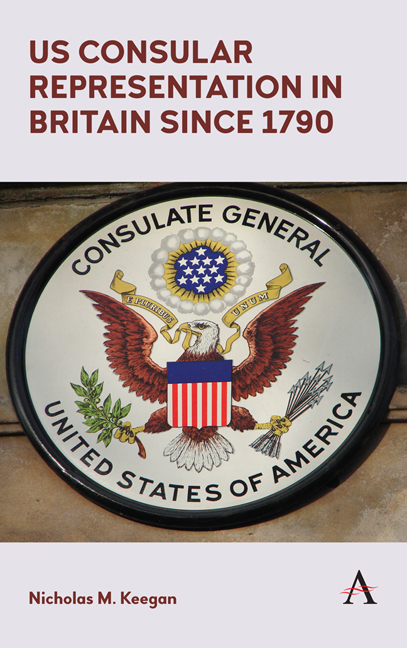Book contents
- Frontmatter
- Dedication
- Contents
- List of Illustrations
- Foreword
- Preface
- Acknowledgements
- Introduction
- PART 1
- PART 2
- PART 3
- Chapter Six Consular Posts and Consular Agencies in Major Cities
- Chapter Seven Belfast
- Chapter Eight Birmingham
- Chapter Nine Bradford
- Chapter Ten Bristol
- Chapter Eleven Cardiff
- Chapter Twelve Dublin
- Chapter Thirteen Dundee
- Chapter Fourteen Dunfermline
- Chapter Fifteen Edinburgh and Leith
- Chapter Sixteen Falmouth
- Chapter Seventeen Liverpool
- Chapter Eighteen London
- Chapter Nineteen Newcastle upon Tyne
- Chapter Twenty Southampton
- Chapter Twenty-One Stoke on Trent
- Chapter Twenty-Two An Evolving, Adaptive Service
- Appendix: Locations and Categories of Consular Offices
- Notes
- Sources
- Bibliography
- Index
Chapter Fifteen - Edinburgh and Leith
from PART 3
Published online by Cambridge University Press: 21 June 2018
- Frontmatter
- Dedication
- Contents
- List of Illustrations
- Foreword
- Preface
- Acknowledgements
- Introduction
- PART 1
- PART 2
- PART 3
- Chapter Six Consular Posts and Consular Agencies in Major Cities
- Chapter Seven Belfast
- Chapter Eight Birmingham
- Chapter Nine Bradford
- Chapter Ten Bristol
- Chapter Eleven Cardiff
- Chapter Twelve Dublin
- Chapter Thirteen Dundee
- Chapter Fourteen Dunfermline
- Chapter Fifteen Edinburgh and Leith
- Chapter Sixteen Falmouth
- Chapter Seventeen Liverpool
- Chapter Eighteen London
- Chapter Nineteen Newcastle upon Tyne
- Chapter Twenty Southampton
- Chapter Twenty-One Stoke on Trent
- Chapter Twenty-Two An Evolving, Adaptive Service
- Appendix: Locations and Categories of Consular Offices
- Notes
- Sources
- Bibliography
- Index
Summary
Leith was at one time an independent burgh, with its own provost and town council. However, it was always regarded as Edinburgh's port, and in 1920 was incorporated into the City of Edinburgh.
Initially, therefore, the consulate was located in Leith but it moved several times between Leith and Edinburgh before settling permanently in Edinburgh's city centre, some two miles away, in 1883. The first consul was Harry Grant, a South Carolinian, who was appointed in October 1798. One of his earliest comments was to complain about the cost of obtaining his exequatur, saying ‘ten guineas is a great deal [sic] money to pay.’ He seems not to have regarded his appointment as warranting his full-time presence since during 1800 and 1801 he spent almost eight months in Paris on business, although he informed Rufus King, the American minister in London, rather magnanimously, that while there he would be on the lookout for and report on French ‘sentiments regarding our country’.
His successor, Joel Hart, a physician from New York, is probably best known for having been absent from his post for 16 years, the Department being unaware that he had left. He was appointed in February 1817 but did not assume nominal charge until 1818 whereupon he immediately appointed Robert Grieve, a Leith businessman and Justice of the Peace (magistrate), as vice consul to run the office. Grieve explained to Secretary of State Louis McLane (1833– 1834) ‘the reason why you have not heard from that Gentleman [Hart]’ is because ‘he had never resided’ in Edinburgh but had chosen to live in London, leaving Grieve in complete charge. As far as he was aware, Hart had returned to the United States round about 1823. As well as acquainting McLane of the situation, Grieve made the case for upgrading the Leith office to be headed by a full-time consul and put himself forward for the position. He had had long experience in representing American interests. In 1806, William Lyman, consul in London, had appointed him agent for American seamen at Leith, although it transpired that he had no authority to make such an appointment and William Pinkney, minister in London, informed Grieve of this in 1810. Pinkney, however, was favourably disposed to Grieve being appointed deputy consul. Grieve had also been appointed as vice consul by successive consuls in Glasgow in 1824, 1831, and 1833.
- Type
- Chapter
- Information
- US Consular Representation in Britain since 1790 , pp. 149 - 164Publisher: Anthem PressPrint publication year: 2018

